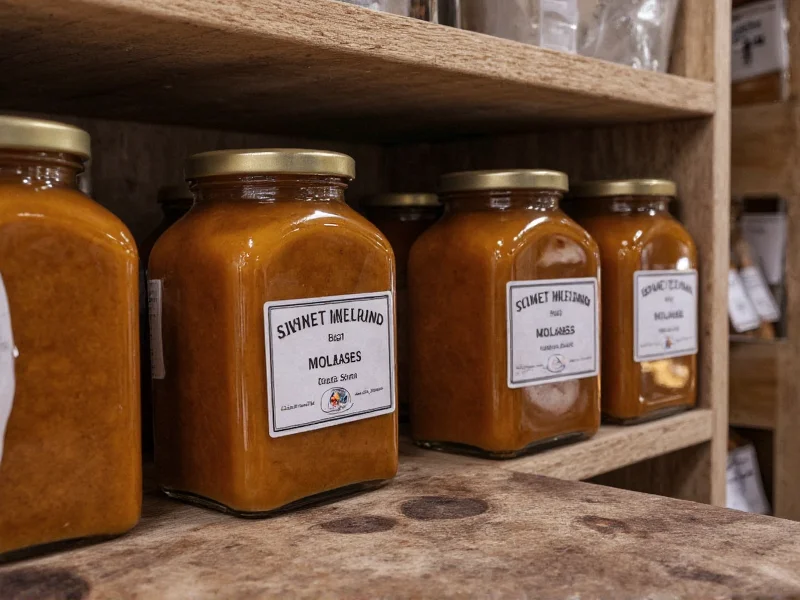Understanding molasses shelf life is essential for home bakers, cooks, and anyone who keeps this versatile sweetener in their pantry. While molasses doesn't technically spoil due to its high sugar content and low moisture, its quality does change over time. This comprehensive guide explains everything you need to know about molasses longevity, storage best practices, and how to determine if your molasses is still good to use.
Understanding Molasses Preservation Properties
Molasses is a byproduct of sugar refining with natural preservation qualities. Its high sugar concentration (typically 45-50% sucrose) creates an environment where bacteria and mold struggle to grow. This scientific principle explains why does molasses go bad is a common question with a nuanced answer. Unlike perishable foods, molasses doesn't become unsafe in the traditional sense, but its flavor, color, and texture do evolve.
Factors Affecting Molasses Shelf Life
Several elements influence how long molasses maintains optimal quality:
| Factor | Impact on Shelf Life | Recommendation |
|---|---|---|
| Container Seal | Loose lids allow moisture and contaminants | Always use airtight containers after opening |
| Storage Temperature | Heat accelerates quality degradation | Store below 70°F (21°C) away from heat sources |
| Light Exposure | UV rays cause flavor compounds to break down | Use opaque containers or store in dark cabinets |
| Molasses Type | Blackstrap has shorter flavor stability than light | Use blackstrap within 1 year for best results |
How Long Does Molasses Last? Detailed Timeline
The molasses shelf life after opening differs from unopened containers:
- Unopened containers: Indefinitely safe when stored properly, with best flavor quality maintained for 2-3 years past printed date
- Opened containers: 1-2 years for optimal flavor, though remains safe indefinitely with proper storage
- Refrigerated molasses: Extends flavor quality by 6-12 months but may cause crystallization
- Blackstrap molasses shelf life: Slightly shorter (12-18 months) due to higher mineral content
Signs Molasses Has Gone Bad
While rare, molasses can develop issues. Check for these signs molasses has gone bad:
- Mold growth: Any visible mold means discard the entire container
- Unusual odors: Sour, alcoholic, or fermented smells indicate spoilage
- Texture changes: Excessive crystallization that doesn't dissolve when heated
- Color shifts: Significant darkening or cloudiness beyond normal variation
- Off-flavors: Bitter or sour taste when sampled
Remember that natural separation of sediment is normal in molasses and doesn't indicate spoilage. Simply stir well before use.
Best Practices for Molasses Storage
Follow these molasses storage tips to maximize shelf life and maintain quality:
- Seal tightly: Always ensure the lid creates an airtight seal after each use
- Choose appropriate containers: Transfer to glass or food-grade plastic if original container isn't resealable
- Avoid moisture introduction: Never use wet utensils when handling molasses
- Store away from heat: Keep in a cool, dark pantry away from stoves or ovens
- Consider refrigeration: For extended storage beyond 18 months, refrigeration slows quality degradation
Food Safety Considerations
Many wonder can you use expired molasses safely. The answer depends on condition:
Molasses rarely becomes unsafe to consume due to its natural preservative qualities. However, quality degradation affects recipe results. If your molasses shows no signs of spoilage but has been stored for several years, consider using it in strongly flavored applications like gingerbread rather than delicate recipes.
For molasses expiration date concerns, remember that "best by" dates indicate peak quality, not safety deadlines. Properly stored molasses remains safe well beyond these dates, though flavor intensity diminishes over time.
Reviving Old Molasses
If your molasses has thickened significantly but shows no spoilage signs, you can often restore usability:
- Place the sealed container in warm water for 10-15 minutes
- Add 1-2 teaspoons of hot water per cup of molasses and stir thoroughly
- Store revived molasses in the refrigerator to prevent further crystallization
Note that these methods work for texture issues but cannot restore lost flavor compounds in very old molasses.
Does molasses need to be refrigerated after opening?
Refrigeration isn't necessary for safety but can extend flavor quality by 6-12 months. Many prefer room temperature storage for easier pouring, as cold molasses thickens significantly. If refrigerating, always return to room temperature before use for best results in recipes.
How can I tell if my molasses is still good to use?
Check for mold, unusual odors (sour or fermented), or significant texture changes. Natural separation of sediment is normal - simply stir well. If it smells sweet and caramel-like with no off-notes and pours smoothly when warmed, it's likely still good for use in recipes.
Why does my molasses have crystals at the bottom?
Crystallization occurs when sugar molecules separate from the liquid. This is normal in older molasses and doesn't indicate spoilage. Gently warm the container in hot water and stir thoroughly to dissolve crystals. To prevent future crystallization, ensure the container is tightly sealed and stored away from temperature fluctuations.
Can I freeze molasses to extend its shelf life?
Yes, freezing molasses is an effective preservation method. Pour into an airtight container with 1-inch headspace for expansion, or freeze in ice cube trays for portioned use. Frozen molasses maintains quality for 2+ years. Thaw in the refrigerator before use, and expect slight texture changes that won't affect most recipes.
Does blackstrap molasses have a different shelf life than regular molasses?
Blackstrap molasses typically has a slightly shorter optimal shelf life (12-18 months) compared to light or dark molasses (18-24 months) due to its higher mineral content and stronger flavor profile that degrades more noticeably. However, both types remain safe indefinitely when stored properly in sealed containers.











 浙公网安备
33010002000092号
浙公网安备
33010002000092号 浙B2-20120091-4
浙B2-20120091-4